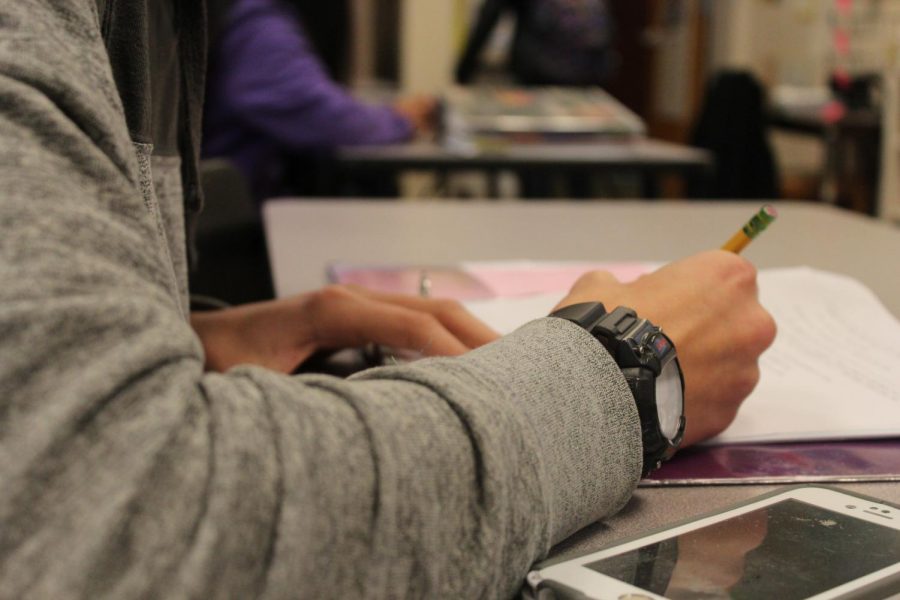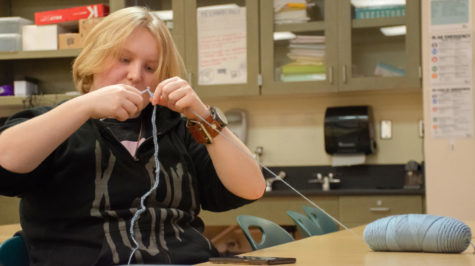Stress coping tips for finals
Laura Masters and Murphy Kludt
January 31, 2018
With the end of the semester coming up, students and teachers alike are experiencing the harsh symptoms that occur with stress. Finals can cause anxiety for students, and teachers undergo the stress of grading and ensuring that they are correct and in on time. Stress is a mental and physical response to everyday occurrences, but when your body undergoes the symptoms of stress continuously, it can take a toll on your health. Stress can raise your risk of heart disease, cause ulcers and a weakened immune system to name a few.
Junior Gracie Martin has been able to find a way of dealing with stress that works for her. “Well when I feel stressed out, I enjoy listening to some calming music. I also like taking a nap every once in a while to give myself a break from all of the stress and anxiety that finals can cause,” Martin said. “I think students need to remember to take small breaks and do something that they enjoy to calm themselves down, but they also need to make sure that it doesn’t take too much time out of their studying.”
Trauma informed specialist coordinator, Alfonso Ramirez, manages a pilot program that studies the impacts of trauma informed approaches in high school. “Stress involves a physiological experience in your body so you have chemicals that are being created, you have your body being prepared to manage the stress whatever that stress is. It’s a good thing for us. The problem happens when the stress becomes chronic or if it’s so overwhelming that it creates a lasting change in the way your body responds to stress. If the stress is too overwhelming in the moment that’s going to impair your ability to function when you’re not stressed and if your stress is chronic again that’s going to impact your ability to manage your stress,” Ramirez states.
He recommends that students get to know themselves and find out what they are like in calm conditions. Being able to identify those cues that tell your body that things are okay make it easier to help yourself relax when you are stressed. There are many different resources around the school that are available and soon there will be an online source that is especially for the students. “Well there’s always a counselor you can go to or teachers that are available. We’re currently in the middle of this project trying to figure out what are those resources that will help teens. We would like to be more responsive to the needs of youth today and to be able to do that we have to be able to hear from you. They could just contact me, come to room 406,” Ramirez said.“We’re going to create a student page on our Tigard High Trauma Resilient website that will be more geared toward students and what they can do possibly things that are written by students as well and that’s at www.traumaresilient.com which will hopefully be ready by the end of the semester.”
TIPS:
TAKE BREAKS
Since a human’s average attention span is about an hour, a really good way of focusing and studying for a long period of time is to take a break for ten to fifteen minutes for every hour spent studying. In those ten to fifteen minutes, try doing something that you enjoy such as going outside or taking a quick power nap.
STAY HYDRATED
It can be easy to forget to take care of yourself during finals week, so remember to eat and drink water. There are many ways of dealing with stress, make sure you look after yourself.
KNOW YOURSELF
Everybody has their own way of dealing with stress that is caused by finals. Some students completely isolate themselves and study for weeks while others choose to surround themselves with people.
LISTEN TO MUSIC
Listening to classical or acoustic music with minimal words can help students stay focused while studying.
DON’T FORGET
If stress levels are overwhelming, talking to someone can be helpful. There are multiple resources at the school that can offer a way of lowering stress levels.

















